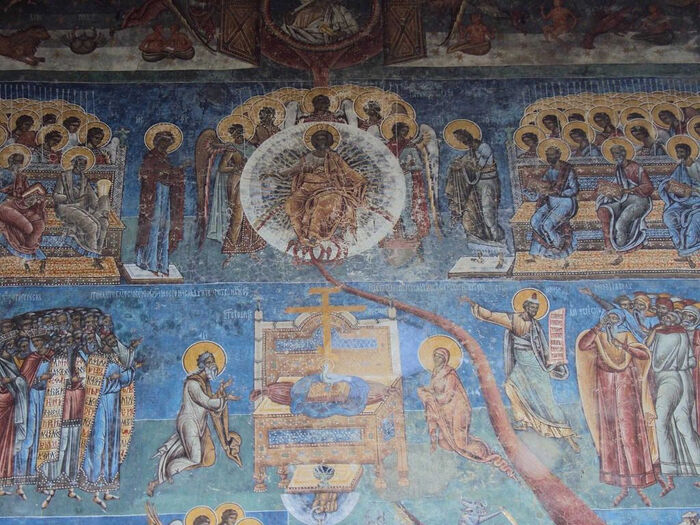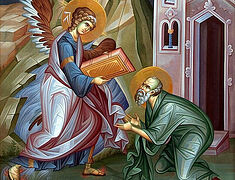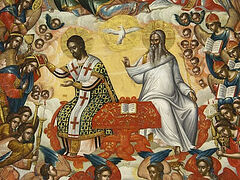Talk 6. The Mystery of the Name of God
We continue to examine the greeting from the epistle to the seven Churches of the book of Revelation.
John to the seven Churches which are in Asia: Grace be unto you, and peace, from Him Which is, and Which was, and Which is to come; and from the seven spirits which are before His throne; And from Jesus Christ, Who is the faithful witness, and the first begotten of the dead, and the Prince of the kings of the earth (Rev. 1:4-5).
First of all, let’s analyze the phrase, And from the seven spirits which are before His throne.
The seven-fold Holy Spirit
The Hypostasis of the Holy Spirit is symbolically represented by seven spirits. It expresses the fullness of the gifts of grace bestowed by the Spirit. The Spirit of God is represented in the plural, and precisely seven in order to show the multiplicity of His gifts, the diversity of His ministries and actions.
In the book of Isaiah, there is a prophecy of Jesus Christ:
And the Spirit of the Lord shall rest upon Him, the spirit of wisdom and understanding, the spirit of counsel and might, the spirit of knowledge and of the fear of the Lord; And shall make Him of quick understanding in the fear of the Lord (Is. 11:2-3).
We see seven spirits in one Spirit, with Whom Jesus Christ was anointed. The anointing of Christ is the fullness of His Divinity, which the Apostle says dwells in Christ bodily (Col. 2:9).
In the prophetic words of Isaiah is found the message of the Holy Spirit, Who will abide in Christ and then descend upon the Church. “The image of the Holy Spirit, Which [is] before His throne, shows that He will be sent and is ready to go to the whole earth and be another Comforter for those who believe in the Son of God,” writes Professor A. A. Zhdanov.
“This is itself the sacred character of the Spirit Who is to be worshiped that includes ineffable praise and does not indicate any form of nature,” notes the ancient interpreter Apringius.[1]
Some exegetes see here seven messengers of God, angels (Ecumenius). If armed with such a thought, then the number of seven can point to the seven angels from Tobit 12:15: I am Raphael, one of the seven holy angels, which present the prayers of the saints, and which go in and out before the glory of the Holy One. Or the symbolic number seven denotes the fullness of all the angels who are in the service of God (“ministering spirits”—cf. Heb. 1:14).
The seven spirits are mentioned in the epistle to the seven Churches. Seven and seven—perhaps we can see here an indication that God gave each of these Churches the Holy Spirit, or that each Church received some special gift of the Holy Spirit.
Further, the fifth verse speaks about the Lord Jesus Christ. Note that if we understand the expression, Which is, and Which was, and Which is to come, as referring to God the Father, and, the seven spirits which are before His throne, as referring to the Holy Spirit, then St. John names the entire Most Holy Trinity in his greeting: Father, Son, and Holy Spirit.
The faithful witness
And from Jesus Christ, Who is the faithful witness, and the first begotten of the dead, and the prince of the kings of the earth (Rev. 1:5).
Verses 4-5 have unusual grammar. The Greek text doesn’t follow the basic rules of declension. Grace be unto you, and peace, from…—and then the names should be in the genitive case, but they’re in the nominative. If we translate it literally, it would be: “Grace to you and peace from (He) is, and (He) was, and (He) is to come… and from Jesus Christ, (He) the witness, (He) the faithful, (He) the firstborn of the dead, and (He) the prince of the kings of the earth.” Everything marked by the pronoun (He) is given in the nominative case with a definite masculine article.
Why did St. John the Theologian use the nominative instead of the genitive case? Perhaps the idea is that he did not change the case of the name of God to emphasize the immutability and independence of God. The Lord is dependent upon nothing, including the rules for declining nouns. Such grammatical “errors” appear several times in Revelation and have a theological significance.
The faithful witness, and the first begotten of the dead, and the prince of the kings of the earth. The beholder of mysteries emphasizes the most important thing in the Person and ministry of the Lord Jesus Christ: His sufferings and death (the faithful witness), Resurrection (the first begotten of the dead), and glory (the prince of the kings of the earth). We will briefly discuss each of these designations.
The faithful witness. Jesus is the witness of the truth of God. The Lord said to Nicodemus: Verily, verily, I say unto thee, We speak that we do know, and testify that we have seen (Jn. 3:11). Christ said to Pontius Pilate: To this end was I born, and for this cause came I into the world, that I should bear witness unto the truth (Jn. 18:37).
A witness is he who speaks about what he saw with his own eyes. And Christ is the true witness of God, Who before Pontius Pilate witnessed a good confession (1 Tim. 6:13).
Christ testifies of the Father and of the truth. He Himself is the Truth.
For secular Greek writers, the word μαρτυς (“witness”) meant a person who was present during some event and also gave testimony about it, chiefly in court. In the language of the Biblical authors, it is connected:
a) to the Prophets, the heralds of the will of God. For example: Here was a man sent from God, whose name was John. The same came for a witness, to bear witness of the Light, that all men through him might believe (Jn. 1:6-7; cf. Rev. 11:3, 19:10);
b) to the Apostles as eyewitnesses of the preaching and sufferings of Jesus Christ. The elders which are among you I exhort, who am also an elder, and a witness of the sufferings of Christ… (1 Pt. 5:1).
And he said to them as preachers of the Gospel: Thus it is written, and thus it behooved Christ to suffer, and to rise from the dead the third day: And that repentance and remission of sins should be preached in his name among all nations, beginning at Jerusalem. And ye are witnesses of these things (Lk. 24:46-48; cf. Acts 1:8, 2:32, 3:15).
c) to the martyrs and confessors, who have sealed their belonging to the Church of Christ by suffering or death.
But the term μαρτυς, in all its meanings, is also applicable to Jesus Christ. His ministry encompasses to an incomparable and greater extent the ministry of the Prophets, Apostles, and martyrs. His testimony gives significance, meaning, and value to the testimonies of His ministers.
The faithful witness—that is, faithful to His testimony even unto death. As Pascal wrote: “I believe only those witnesses who gave their gullets to be slashed.”
The first begotten of the dead
Further, Christ is called the first begotten of the dead.
The question arises: Were there really no resurrections in the Old Testament? These were more like revitalizations than resurrections. All those resurrected died again. The Resurrection of Christ meant the transformation of mortal human nature with all its infirmities into immortal and incorruptible, and the union of the body with the soul forever. Therefore, Christ is truly the first begotten of the dead. His Resurrection is unique.
Interestingly, there are seven resurrections mentioned in Holy Scripture, which are arranged in a definite symmetry.
| Three resurrections in the Old Testament | Three resurrections in the New Testament |
| 1) The resurrection of the widow of Zarephath by the Prophet Elijah (3 Kg./1 Kg. 17) | 4) The resurrection of the son of the widow of Nain by Christ (Lk. 7:15) |
| 2) The resurrection of the son of the Shunammite woman by the Prophet Elisha (4 Kg./2 Kg. 4) | 5) The resurrection of the daughter of Jairus by Christ (Mk. 5:42) |
| 3) The resurrection of the dead man by being touched to the bones of the Prophet Elisha (4 Kg./2 Kg. 13) | 6) The resurrection of Lazarus by Christ (Jn. 11:44) |
But what is the seventh resurrection? The seventh is the Resurrection of Christ. So it doesn’t have a symmetrical parallelism? No, it does!
Thanks to the Resurrection of Christ, our resurrection also became possible. And this coming resurrection of mankind, our resurrection unto eternity, will be a kind of symmetrical correspondence to the Resurrection of Christ.
According to the count, it would be the eighth, which is also not accidental, as the number eight has symbolic meaning: It means eternity.
| 7) The Resurrection of Christ | 8) The resurrection of all of mankind |
In the next article, we will continue to examine the various names of the Lord Jesus Christ in Rev. 1:5-6.
Talk 8. Christians—the Royal Priesthood
Sergei Komarov is a well-known Orthodox writer and catechist based in Moscow.





